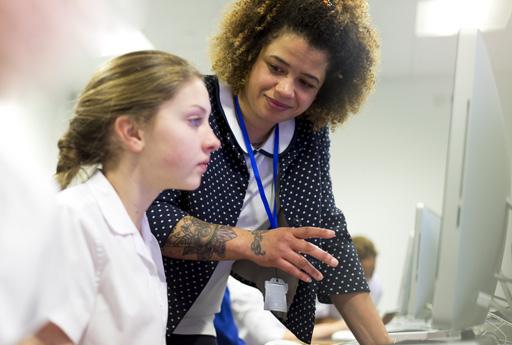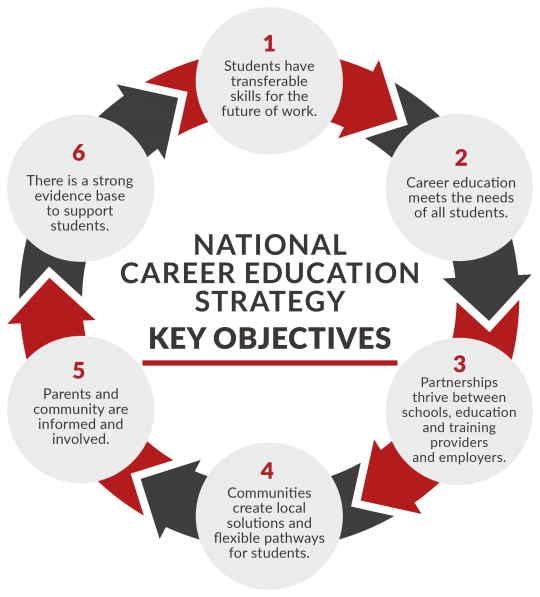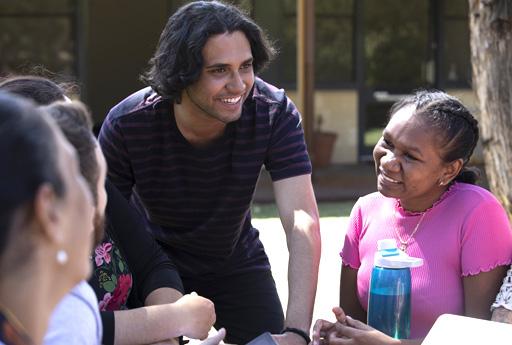What do I want to be when I leave school, how do I get there? What do I need to study to make it happen? So many options, so many ways to start off on the right path, how do I even get started?
All of these questions are probably in most students' heads when they are at secondary school. Supporting our students in secondary schools with advice and information around where they want to head in a career path is an important part of their journey.
Understanding the options and knowing they have lots of pathways available to choose from, can be quite daunting. If you're a teacher or career practitioner, building a network for advice from career practitioners in schools, community members, parents, and using the free services available at Jobs and Skills Centres, can help you ensure your students are better prepared for their future.
Free career workshops for your school
Did you know the Jobs and Skills Centres offer free career workshops which can be held at your school?
Work together with the team at your local Jobs and Skills Centre (JSC) to plan a career workshop for Year 9, 10, 11 or 12 students which will give them information on their study options whilst still at school, training choices in vocational education and training (VET) or university, and how to navigate through starting a career journey.
The JSC team can help students with their career ideas and how they can get to where they want using tools and resources for planning study, work placement, applying for courses and interview preparation.
Each workshop is a general advice session, and a follow-up one on one career consultation can be arranged with the JSC for students and parents.
All the JSC services are completely free, and with 15 JSCs across Perth and regional WA there's sure to be one near you.
Information for career practitioners
We have put together some information and resources to help with providing career advice to school students. Please follow the links below.
Encouraging lifelong learning
Career support for parents
Information for students

Preparing students for the future world of work
Now more than ever, we need to prepare school students for the future world of work — with higher demands by employers for skilled and flexible workers who can navigate the work environment, and expectations for not only technical skills but also employability skills.
Students and their parents are aware of these changing needs and are demanding more from their schooling to prepare them. Being flexible and responsive to change is a joint effort from students, parents and their teachers, and this is where you can play a key role.
Equipping students to make informed career and study choices is vital, as career education, workplace exploration and work related study will enable students to explore career options and understand the demands and expectations of the workplace or industry they are looking to enter. Being able to gain workplace skills whilst still at school through nationally recognised training provides a pathway to a future career and sets students up for lifelong learning.
Career advice should:
- be provided in an impartial manner — without bias or favouritism towards a particular education or work option;
- offer and explore arange of education or training options — including apprenticeships and other vocational pathways;
- considerate of students’ best interests and aspirations; and
- support their individual passions and strengths.
Skills for the future world of work
What skills will students need for the future world of work? What will the future world of work even look like?
Technical, practical and employability skills can give students a head start into the world of work, and are transferable to all situations.
In this Career Industry Council of Australia (CICA) video, you can hear the advice of secondary school students and employers about the skills that will be needed for future careers.
Developing transferable skills - A success story!
Having transferable skills to be work ready for the future is something that Cecil Andrews College has adopted as part of their curriculum through vocational learning for all students from Year 7 to 12. The college has over 25 per cent Aboriginal and Torres Strait Islander students, as well as new migrants, refugees and a significant number of disadvantaged students.
Principal Stella Jinman decided to introduce vocational learning programs to engage students, by making learning interesting and relevant to future employment. The College's aim was to inspire students’ curiosity and love of learning, and build transferable skills that could help them imagine a place for themselves in the future world of work.
The school pursued this aim this through a range of project-based programs that complement VET in upper secondary, and allowed industry and community collaboration to create learning pathways, many of which are focused on STEM (Science, Technology, Engineering and Maths) areas.
Through this initiative, many students have developed transferrable skills and boosted their confidence levels. Some students who had experienced multiple learning challenges and a history of low achievement have now developed ambition and self-worth.

Career education for school students
Career education in schools provides an opportunity for students to explore options across the curriculum, and to develop transferable skills and capabilities that can help them to make informed career decisions for the ever-changing future world of work. This builds resilient individuals who can adapt and manage multiple career changes in their lifetime.
The National Career Education Strategy has been developed by the Australian Government, to reflect six nationally agreed key objectives for governments, schools, and employers to support the provision of high quality career education for all school students.
These six objectives are outlined in this diagram (at right).
Connections made by schools with parents, employers, and the wider community create a support network for students that they can utilise for their own lifelong learning and career pathway. This extended support scaffolds students with options for advice and support when making choices, and ensures learning experiences are authentic and reflect post-school life.
Work related learning and work exploration will be the beginning of transferable skills into the workplace.
Supporting a student with evidence-based conversations and providing tools and resources will help with decision-making about their post-school career options.
Why career education is so important in schools
How can we equip students early on and develop knowledge, skills, and attributes that will assist them to make informed decisions about their future?
- Academic learning being linked to workplace practices can support students with the knowledge to transfer into their future career.
- Working alongside parents and employers aligns involvement and ensures everyone is informed.
In this short video, the Career Industry Council of Australia (CICA) explains career education and its real purpose in schools and the community.
Career education resources
Teachers, career practitioners and VET Coordinators within schools are a valuable source of advice and guidance, and will most likely be the starting point for a student wishing to explore their future career path. Supporting students and their parents to navigate the way through planning a career journey requires experience and research, and there are some great resources and tools available to support the work you do.
- Career planning resources from Jobs and Skills WA
- Department of Education — School to work transitions - career education resources
- Career bullseye posters — featuring a series of career posters available to download to help students identify occupations that link with subjects studied at school
- Career Education Association of WA
- myfuture — Offers a vast array of career information, articles and links to resources for parents, career advisors and teachers to assist students with their career journey
- Job Outlook — Resources that can help make decisions about study and training, with skills match and career exploration quizzes
- Career Industry Council of Australia (CICA) - Resources available for career practitioners
Occupation profiles for career decisions
We have hundreds of occupation profiles, each with detailed information on what each occupation does, the working conditions, the tools and technologies needed, and education and training courses related to the skills and knowledge the occupation requires.
These occupation profiles are a great way for students to explore career options — they might find they already have some relevant skills.
Using the occupation profiles search
As this list contains hundreds of occupation profiles, you can search by keyword, or by letter A—Z.
Industry area
Use this filter to search within a specific industry.
Once you have found occupations that interest you, you could conduct more detailed research into those careers — for example; talking with people who work in that industry.

What is career planning?
Career planning is a process of helping a student decide what kind of career they are seeking. Thinking about what they'll need to do to achieve it, setting goals, and then identifying what they can do to achieve those goals. It should be a long term plan, with shorter term milestones that can be achieved — for example; within two years, five years and ten years. Career planning also involves matching personal goals, skills and abilities with the type of work that will be satisfying and rewarding.
When working with students, you may find it helpful to look at career planning as a three-phase process to help them get on their way, with study options leading into their career journey. Using career planning strategies and tools that support career education is vitally important. Further detail around each of the three phases is outlined below, with suggested resources to facilitate the process.
Discover with career exploration
Develop your career insights
Drive building a career portfolio
This process helps manage and adapt learning choices leading to career options, and it can be used for all work and learning decisions, big or small. If your student is just starting their career journey, we recommend working through the stages in order; however, you can start with any stage and move through each one as needed.
| Phase 1 Discover — Career Exploration |
|---|
|
This is an important first step for students to get started in their career journey, and discover more about themselves and the exciting world of work, in context of their future plans. Being more aware of their own strengths, positive attributes and skills will build confidence for their future. |
| Phase 2 Develop Career Insights |
|---|
|
Learning about different career pathways, occupations and jobs, will help to further develop a student's understanding of potential future pathways and start to consider making some career decisions. This is where an action plan is important, to encourage commitment to future plans. |
| Phase 3 Drive — Career Portfolio |
|---|
|
Building a portfolio to capture career goals and plans is a useful way for students to reflect on the research and exploration completed so far. Creating a career action plan, building a resume ready for job interviews, and examples of schoolwork or awards is a good start to prepare them for entry into employment or further study. |
The following websites also offer tools, resources and advice to support students with their study and career journey.
|
|
|
|
|
|
|
Support from your Jobs and Skills Centre
You can always chat with the team at your local Jobs and Skills Centre if you would like some support or assistance for career exploration and planning with students. Just call your nearest JSC on 13 64 64, or use our WA map to find your local centre.

Vocational education and training
In today’s competitive job market, having the right skills and qualifications is important. Vocational education and training (VET) provides practical skills and knowledge aligned with the needs of industry and business, through nationally recognised qualifications, to prepare for a career. VET programs can:
- develop employability skills (for example; communication and problem solving skills);
- offer industry specific skills and an understanding of the world of work; and
- help to explore and plan career options.
There are a range of VET courses available, and students can do a VET course while still at school so that by the time they complete Year 12 they will already have a qualification.
Please note that the information that follows is intended as general guidance only, and options for VET programs will be different at each school.
We recommend visiting the VET for secondary students section of the Department of Training and Workforce Development website, for further details of VET programs for delivery in schools. You can also access the VET qualifications register for secondary students here, which provides a full list of all VET qualifications that are available for delivery to secondary school students.
You can also find extensive information about the different VET options available to secondary students, on our School students — What's your plan page.
Vocational education and training (VET) refers to skill-based education and training which can start at secondary school, and is delivered through registered training organisations (RTOs) which include TAFE colleges and private training providers.
The training comprises of certificate, diploma, and advanced diploma levels, and VET courses require students to demonstrate that they have obtained the required skill levels through competency-based assessment.
VET can provide pathways directly into employment, or to higher education such as at university. VET qualifications are nationally accredited and recognised.
VET courses and qualifications focus more on occupational and transferable skills to provide work-oriented and practical skills. VET offers various skills to help people:
- gain valuable skills to further their education;
- upgrade their skills in a new area;
- join the workforce; or
- move into a new or different career.
VET also offers an alternate option for students who may not be as academically inclined, as it is generally more hands-on and practical and competency is demonstrated rather than achieved via examinations.
VET qualifications at levels one to four are for building (Certificates I and II) then improving (Certificates III and IV) initial skills. They teach industry-specific skills and enhance knowledge in communication, numeracy, teamwork, and communication.
The length of these courses varies from six months to one or two years and can start with school-based training.
VET qualification levels are determined by the Australian Qualifications Framework.
VET at Diploma and/or Advanced Diploma levels requires one or two years of full time study, and these qualifications are designed for students with existing skills and knowledge in their field. They aim to prepare students for enterprise, industry, and professional careers.
These qualifications can provide a pathway into university.
VET qualification levels are determined by the Australian Qualifications Framework.
The Skills Ready section of our website contains information about choosing a VET course and/or training provider.
Our School students — What's your plan? page has extensive information about VET courses and options including apprenticeships and traineeships, and VET study at school.
You can always browse through the course search to view the VET courses on offer at a TAFE college or training provider close to you.
VET for secondary schools
Offering VET for secondary school students provides an environment for learning and preparation for the future world of work, based on business and industry needs. It offers students the opportunity to experience an industry and decide whether it is for them.
Students are able to achieve a level of learning and qualifications with support and collaboration from their school, parents, and employers. This exploration through VET reduces the likelihood of students making uninformed choices about post-school education or employment options, while also getting WACE and keeping options open.
Schools can offer a selection of VET qualifications for students, which can contribute to the Western Australian Certificate of Education (WACE). These include school-based apprenticeships and traineeships, and pre-apprenticeships and pre-traineeships.
VET training programs in secondary schools are aimed at:
- offering a range of pathways to meet the diverse needs and aspirations of all young people;
- supporting achievement of WACE;
- supporting students to make a successful transition from school to further education, training and/or employment;
- learning that adds value to students' broader general education; and
- skills development aligned with local employment and further education and training opportunities, such as part time work or further study.
A range of programs are available in Western Australia for delivering a VET program in secondary schools.
- TAFE / Institutional delivery
- School-based apprenticeships and traineeships
- Pre-apprenticeships and pre-traineeships in schools
- Aboriginal school-based training
Schools delivering VET programs in WA have an operational framework and guidelines to follow.
Workplace learning is a structured and formalised program through which Year 11 and 12 students can access the opportunity to develop practical on the job experience gained through work placement. This also can contribute to the Western Australian Certificate of Education (WACE).
Find out more on workplace learning from your school or visit the School Curriculum and Standards Authority website.
The VET qualifications register for secondary students and registered training organisations (RTOs) provides industry advice to guide the selection and delivery of qualifications to secondary students. This advice is to enable schools RTOs and parents to help choose industry-supported qualifications and options.
Funded VET programs for secondary students
Western Australia TAFE colleges are funded by the Department of Training and Workforce Development (the Department) to deliver a number of fee-free places to secondary students, in industry supported VET qualifications that are aligned to the State's industry needs, to help students achieve their WACE. There are three VET programs for secondary students that are funded by the Department of Training and Workforce Development, as follows.
The Aboriginal school-based training program (ASBT) is for Aboriginal students in Years 10, 11 and 12. The ASBT program aims to help Aboriginal students gain the skills to keep studying after school or get a job.
Pre-apprenticeships (PAiS) and pre-traineeships in schools are Certificate II qualifications that can lead to a related apprenticeship or traineeship. In these programs; students attend school, train at a registered training organisation (RTO) such as a TAFE college, and undertake work placement.
School-based apprenticeships and traineeships (SBA or SBT) are paid employment-based training programs for full time school students who are generally 15 years of age and over. In an SBA or SBT you will be a full time student and a part time employee, with the same employment and training conditions and responsibilities as other apprentices/trainees.
- For details about courses that may be available, please refer to the Department's VET for secondary students funding policy
- You can also take a look at the full list of VET qualifications available for secondary school students here
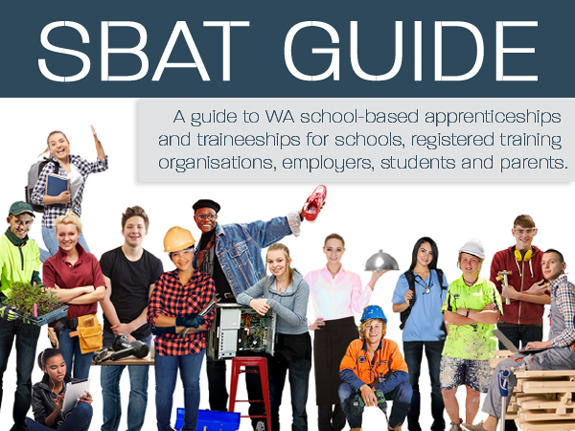
School-based apprenticeships and traineeships guide
A guide to Western Australian school-based apprenticeships and traineeships (SBATs) has been developed to support schools, RTOs, employers, students, parents and other stakeholders operating in the apprenticeship and traineeship system.
The guide provides detailed information on the key aspects involved in a school-based apprenticeship and traineeship (SBAT) arrangement. including requirements for the on the job component, as well as a range of examples of SBATs in practice.
Its user-friendly format also provides links to fact sheets and other relevant information and websites.
The VET qualifications register for secondary students provides industry advice for schools and RTOs on the suitability of qualifications for secondary students and delivery requirements to meet industry standards. The register aims to assist schools and RTOs to select qualifications that are more likely to be completed by secondary students or help them to transition effectively to further training or employment. It is updated annually.
You can also view the Register of Class A and B qualifications (the Class A/B Register), which lists all VET qualifications available in WA as an apprenticeship or traineeship. The Class A/B register includes all qualifications available as school-based apprenticeships or traineeships, and is updated monthly.
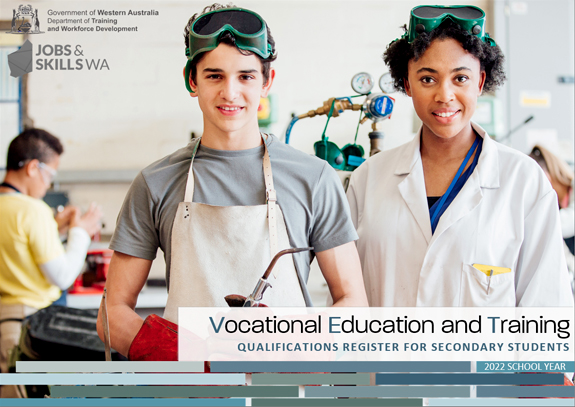
Meet VET Ambassador Matt King
Matt King was the WA Training Awards VET Teacher/Trainer of the Year in 2020, and runner-up in the Australian Training Awards for the same category. He is a VET trainer at Swan Trade Training Centre, where he delivers the pre-apprenticeship Certificate II in Electrotechnology.
Matt's passion for teaching and demonstrating how the hands-on process of learning for students to participate, while gaining skills that are transferrable in many ways.
Check out this short video to hear from Matt about how VET can create fantastic opportunities for students.
Fee free and low fee training
As a career practitioner, it's important to guide students towards training in industry areas where the job opportunities are. Students can prepare for the future world of work with free training, or a half-price course or qualification.
Gaining a nationally accredited and recognised qualification can be a significant advantage for students just starting their career journey.
In addition to a number of job ready skill sets (short courses) that are completely fee-free for under 24s and jobseekers no longer at school, there's over a range of qualifications with course fees reduced by half or more in a wide range of industry and study areas to choose from; including pre-traineeships.

How we can help
Jobs and Skills Centres have professional career specialists who can support you every step of the way with advice and information on training and career planning for students. They also offer free workshops that can be held at your school, with topics including career planning and jobseeking. All their services are completely free, and with 15 JSCs across Perth and regional WA there's sure to be one near you. Call your local JSC on 13 64 64, or use our WA map to locate your closest centre.




